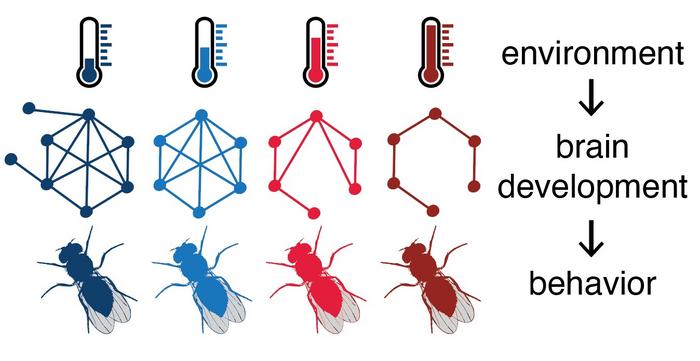The developmental trajectory of poikilothermic organisms, encompassing a diverse range of species from insects to reptiles, is profoundly influenced by environmental factors, particularly temperature. Recent groundbreaking research conducted by a team at Johannes Gutenberg University Mainz (JGU) has illuminated the intricate relationship between temperature and brain development in a model organism—Drosophila melanogaster, commonly known as the fruit fly. Under the leadership of Dr. Carlotta Martelli, this research reveals how varying temperatures during critical developmental stages can impact not just neural connectivity, but also subsequent behaviors associated with olfactory processing.
In the study, the researchers delved into the olfactory circuits of these fruit flies, given the paramount role of olfaction in dictating survival behaviors. Dr. Martelli articulated their findings, noting a marked increase in synaptic formation and connectivity among neurons when the flies were reared at lower temperatures. This observation suggests that temperature is a significant regulator of neural plasticity within this critical sensory pathway. The implications of such findings extend beyond mere laboratory curiosity; they resonate with broader ecological concerns, particularly in an era where climate change alters the thermal landscape of habitats.
Temperature, a fundamental environmental variable, governs the kinetics of biological processes—this is a notion deeply rooted in metabolic theory. The researchers postulate that higher temperatures accelerate metabolic rates, thereby facilitating quicker developmental timelines. However, they uncover a paradox: while rapid development is expected at elevated temperatures, it can simultaneously hinder the intricate refinements essential for optimal brain architecture, potentially compromising behavioral competence. This duality highlights the need for a nuanced understanding of how temperature acts as a double-edged sword in developmental biology.
Notable differences were observed as the flies developed under two contrasting thermal conditions; those nurtured at 18 degrees Celsius exhibited strikingly more synaptic partners and enhanced connectivity within their olfactory circuits compared to their counterparts developed at 25 degrees Celsius. This significant disparity was measured using advanced genetic techniques that enabled the identification of neuron-to-neuron interactions, providing a rich tapestry of insights into the developing nervous system.
Dr. Martelli’s team articulated a captivating theory to elucidate the findings, proposing that neurons could experience divergent metabolic conditions relative to other somatic cells. This hypothesis posits that neuronal metabolism operates more efficiently at lower temperatures, contrary to the general expectation that overall metabolic activity would similarly decline in colder environments. The necessity for more empirical evidence to support this hypothesis remains, as researchers turn their attention to gene expression analyses during crucial developmental phases.
The effects of temperature are not limited to neural growth and connectivity; they extend into the realm of behavior. Further experimentation revealed that adults reared at lower temperatures displayed heightened attraction to olfactory stimuli, specifically butanone. Flies developed at 18 degrees Celsius demonstrated an increased propensity toward this odor, underscoring a behavioral adaptation linked to their earlier thermal environment. However, the research also uncovered that this enhanced attraction did not equate to improved olfactory perception capabilities in terms of the neuronal activity associated with odor representation itself.
This dichotomy raises thought-provoking questions about how connectivity and downstream brain interpretive processes contribute to behavior. Dr. Martelli’s findings indicate that changes in behavior might stem from modifications within brain circuitry that manages instinctual behaviors, rather than from differences in fundamental sensory processing capabilities. Such insights pave the way for deeper inquiries into the neural substrates underpinning behavior, particularly in the context of environmental variability.
The broader implications of this research are multi-faceted, touching upon ecological dynamics and evolutionary perspectives. As species navigate increasingly variable climates characterized by erratic temperature changes, understanding the interplay between developmental temperature and neural function becomes critical. This knowledge is not just academic; it has potential applications in conservation biology, where predictive models could inform strategies for species survival and adaptation under climate change scenarios.
Moreover, the visual parallels drawn from previous studies on the visual systems of Drosophila lend credence to the thesis that temperature influences neural networks across sensory modalities. It positions temperature as a vital environmental factor that can sculpt the architecture of brains not just in fruit flies, but possibly across a spectrum of poikilothermic organisms, prompting researchers to consider broader ecological implications.
This research underscores the urgency for interdisciplinary approaches that bridge biology, ecology, and climate science. As we stand at a precipice of unprecedented environmental change, the integration of such studies will be crucial for forecasting the adaptive capacities of various species. Insights gained from examining the connections between temperature and brain development could inherently alter our understanding of animal behavior, making it imperative to expand research horizons.
Dr. Martelli’s work not only contributes to the scientific community’s understanding of neural development in the face of environmental pressures but also emphasizes the importance of interdisciplinary inquiry. By combining elements of theoretical physics with neurobiology, the research team has unveiled a compelling narrative about the influence of temperature on the fundamental processes of life that resonates far beyond the laboratory.
In conclusion, the intricate dance between environmental conditions and neural development revealed in this study showcases the profound adaptability of life forms. These insights are essential in crafting comprehensive strategies for biodiversity conservation and understanding the resilience of life in our rapidly changing world. Only through thorough exploration of these relationships can we hope to unravel the complexities of evolution and survival dynamics as they relate to climate change.
Subject of Research: Temperature impacts on brain development in Drosophila melanogaster.
Article Title: Impact of developmental temperature on neural growth, connectivity, and function.
News Publication Date: 15-Jan-2025.
Web References: Science Advances
References: Not applicable.
Image Credits: Credit: ill./©: Carlotta Martelli.
Keywords: Drosophila, temperature, brain development, neural connectivity, behavior, olfactory circuits, poikilothermic animals, climate change, neuroscience, ecological dynamics.
Tags: brain development and environmental factorscritical periods in neural developmentDrosophila as a model organismecological implications of temperature changesfruit fly development and behaviorimpact of climate change on organismsneural plasticity and temperatureneurodevelopmental research in insectsolfactory processing in Drosophilapoikilothermic organism developmentsynaptic formation in fruit fliestemperature effects on neuronal connectivity





